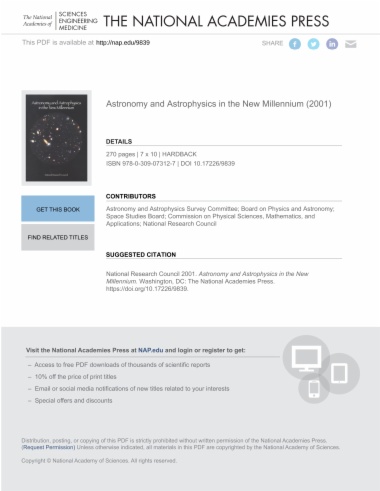In this new book, a distinguished panel makes recommendations for the nation's programs in astronomy and astrophysics, including a number of new initiatives for observing the universe. With the goal of optimum value, the recommendations address the role of federal research agencies, allocation of funding, training for scientists, competition and collaboration among space facilities, and much more.
The book identifies the most pressing science questions and explains how specific efforts, from the Next Generation Space Telescope to theoretical studies, will help reveal the answers. Discussions of how emerging information technologies can help scientists make sense of the wealth of data available are also included.
Astronomy has significant impact on science in general as well as on public imagination. The committee discusses how to integrate astronomical discoveries into our education system and our national life.
In preparing the
New Millennium report, the AASC made use of a series of
panel reports that address various aspects of ground- and space-based astronomy and astrophysics. These reports provide in-depth technical detail.
Astronomy and Astrophysics in the New Millenium: An Overview summarizes the science goals and recommended initiatives in a short, richly illustrated, non-technical booklet.
- Cover
- Front Matter
- Executive Summary
- 1. Recommendations
- 2. The Science Behind the Recommendations
- 3. The New Initiatives: Building on the Current Program
- 4. Benefits to the Nation from Astronomy
- 5. The Role of Astronomy in Education
- 6. Policy for Astronomy and Astrophysics
- References
- Appendix: Definitions
- Index

